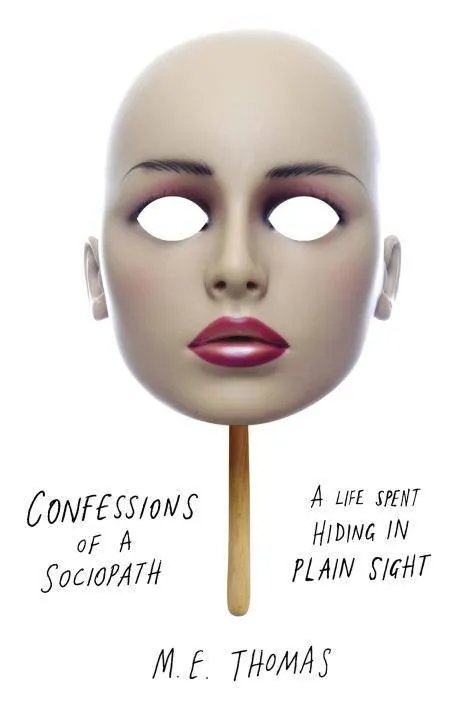
Riot Round-Up: The Best Books We Read in May
We’re posting early this month as we prepare to go into “Best of Book Riot” mode for Memorial Day and Book Expo next week. Enjoy!
 All That Is by James Salter
It has been more than 30 years since Salter last published a novel. He’s granite. He’s damp skin. He’s an unflinching eye. I don’t know anything about the gestation of this novel, and in a way I’m glad because it nearly doesn’t feel like fiction. It feels like a life: the trajectory, in some ways enviable, of Philip Bowman, a young WWII soldier who becomes a New York book editor. The story eddies and curves, as Salter often looks over to secondary characters and follows them for a little while. Forgive the pomposity, but it reminds me of the angels in Wim Wenders’s “Wings of Desire.” At the moment, something quite devastating is about to happen to Bowman. I had to put the book down, to catch my breath, to hope he escapes.
–Jennifer Paull
All That Is by James Salter
It has been more than 30 years since Salter last published a novel. He’s granite. He’s damp skin. He’s an unflinching eye. I don’t know anything about the gestation of this novel, and in a way I’m glad because it nearly doesn’t feel like fiction. It feels like a life: the trajectory, in some ways enviable, of Philip Bowman, a young WWII soldier who becomes a New York book editor. The story eddies and curves, as Salter often looks over to secondary characters and follows them for a little while. Forgive the pomposity, but it reminds me of the angels in Wim Wenders’s “Wings of Desire.” At the moment, something quite devastating is about to happen to Bowman. I had to put the book down, to catch my breath, to hope he escapes.
–Jennifer Paull
 Blessed and Cursed Alike by Kiarna Boyd
One of the millions of great things about books is how you learn things. Learning is fun! Open head, insert information. Most of the main characters in Blessed and Cursed Alike work for motorcycle courier companies, which I learned is a real-life occupation. It’s like being a bike messenger, only louder, faster and crazier. Boyd based her characters on the motorcycle couriers of London after witnessing them in action. It’s wild, dangerous work, and a motorcycle courier’s life expectancy while on the job is only two and a half years. Gulp! So add to the adrenaline-fueled courier lifestyle a dark, wet, unnamed city, an occult conspiracy, and familial bonds and friendships, and you have a fantastic fantasy novel. The action scenes are wonderfully realized, the sexy bits are sexy, and the characters are all worthy of the attention they’re given. This book made me want a motorcycle, a girlfriend, a two-legged cat, and cake. (I just realized that most of those things purr.) I loved it.
–Liberty Hardy
Blessed and Cursed Alike by Kiarna Boyd
One of the millions of great things about books is how you learn things. Learning is fun! Open head, insert information. Most of the main characters in Blessed and Cursed Alike work for motorcycle courier companies, which I learned is a real-life occupation. It’s like being a bike messenger, only louder, faster and crazier. Boyd based her characters on the motorcycle couriers of London after witnessing them in action. It’s wild, dangerous work, and a motorcycle courier’s life expectancy while on the job is only two and a half years. Gulp! So add to the adrenaline-fueled courier lifestyle a dark, wet, unnamed city, an occult conspiracy, and familial bonds and friendships, and you have a fantastic fantasy novel. The action scenes are wonderfully realized, the sexy bits are sexy, and the characters are all worthy of the attention they’re given. This book made me want a motorcycle, a girlfriend, a two-legged cat, and cake. (I just realized that most of those things purr.) I loved it.
–Liberty Hardy
 The Brinkley Girls edited by Trina Robbins
In the 1910’s Nell Brinkley went to New York City to work as an illustrator for one of William Randolph Hearst’s newspapers, The New York Evening Journal. Brinkley’s illustrations of women wearing the latest fashions and possessing masses of curly hair made every woman want to look like a “Brinkley girl.” Through WWI and the 1920s, Brinkley published weekly full-page color comics with surprisingly feminist storylines—women who go on adventures and save the hero, rather than vice-versa—in a visual style that influenced the fashion of women for an entire generation. I adored this book, and not just because Brinkley grew up not very far from where I did; her illustrations are gorgeous and it’s easy to see why women wanted to obtain her “look,” even going so far as purchase Brinkley hair products. All of Brinkley’s color comics are included, and they reminded me of manga series today. Definitely recommend this for anyone interested in Jazz Age or Edwardian art and fashion, or if you read manga.
–Tasha Brandstatter
The Brinkley Girls edited by Trina Robbins
In the 1910’s Nell Brinkley went to New York City to work as an illustrator for one of William Randolph Hearst’s newspapers, The New York Evening Journal. Brinkley’s illustrations of women wearing the latest fashions and possessing masses of curly hair made every woman want to look like a “Brinkley girl.” Through WWI and the 1920s, Brinkley published weekly full-page color comics with surprisingly feminist storylines—women who go on adventures and save the hero, rather than vice-versa—in a visual style that influenced the fashion of women for an entire generation. I adored this book, and not just because Brinkley grew up not very far from where I did; her illustrations are gorgeous and it’s easy to see why women wanted to obtain her “look,” even going so far as purchase Brinkley hair products. All of Brinkley’s color comics are included, and they reminded me of manga series today. Definitely recommend this for anyone interested in Jazz Age or Edwardian art and fashion, or if you read manga.
–Tasha Brandstatter
 Code Name Verity by Elizabeth Wein
I know, I know, everyone else already read this book and loved it and it’s silly that I’m even gushing about it now because I’m so far behind, right? (Actually, I know a lot of people who haven’t read it, so there.) I haven’t finished it yet, but I am loving it a lot. It’s the perfect combination of a likeable, gently snarky tone, excellent writing, and impeccable historical research. I know I’m apparently in for a lot of twists and turns, and I’m looking forward to them all.
–Jeanette Solomon
Code Name Verity by Elizabeth Wein
I know, I know, everyone else already read this book and loved it and it’s silly that I’m even gushing about it now because I’m so far behind, right? (Actually, I know a lot of people who haven’t read it, so there.) I haven’t finished it yet, but I am loving it a lot. It’s the perfect combination of a likeable, gently snarky tone, excellent writing, and impeccable historical research. I know I’m apparently in for a lot of twists and turns, and I’m looking forward to them all.
–Jeanette Solomon
 The Coldest Night by Robert Olmstead
The 1950s conflict in Korea may be “The Forgotten War,” but once you pass through the pages of Robert Olmstead’s devastatingly real novel, it will be hard to disremember the Korean War. Olmstead often turns his attention to historical military conflicts (see also: Coal Black Horse, his 2007 novel about the Civil War), but with The Coldest Night, he has reached a new level of gritty, unsparing literature that also floats like a lyrical dream, sentence by sentence. The book is the saga of Henry Childs and is essentially divided into three parts: the years before Henry ships off to war which tells the beautiful love story between Henry and a girl named Mercy; the harrowing battle accounts in Korea; and Henry’s return from war and his troubled attempts to re-enter civilian life. Olmstead’s descriptions of battle are deceptively simple in detail, but it’s been hard for me to shake them from my head. Like this sentence: “Then the flanks exploded with gunfire and grenades until there was no sound at all but the long unceasing sound of the world’s endless thunder concentrated in one place.” Olmstead fills all of his pages with linguistic thunder.
–David Abrams
The Coldest Night by Robert Olmstead
The 1950s conflict in Korea may be “The Forgotten War,” but once you pass through the pages of Robert Olmstead’s devastatingly real novel, it will be hard to disremember the Korean War. Olmstead often turns his attention to historical military conflicts (see also: Coal Black Horse, his 2007 novel about the Civil War), but with The Coldest Night, he has reached a new level of gritty, unsparing literature that also floats like a lyrical dream, sentence by sentence. The book is the saga of Henry Childs and is essentially divided into three parts: the years before Henry ships off to war which tells the beautiful love story between Henry and a girl named Mercy; the harrowing battle accounts in Korea; and Henry’s return from war and his troubled attempts to re-enter civilian life. Olmstead’s descriptions of battle are deceptively simple in detail, but it’s been hard for me to shake them from my head. Like this sentence: “Then the flanks exploded with gunfire and grenades until there was no sound at all but the long unceasing sound of the world’s endless thunder concentrated in one place.” Olmstead fills all of his pages with linguistic thunder.
–David Abrams
 Confessions of a Sociopath: A Life Spent Hiding in Plain Sight by M.E. Thomas
M.E. Thomas is a sociopath, but she’s never killed anyone. She’s also a law professor and a Sunday school teacher. Confessions of a Sociopath is both Thomas’ story of self-discovery and the introduction to a fascinating, mostly silent community. She investigates the development of the concept of sociopathy, from the first time a similar condition was described to brain scan studies of famously murderous families. She even touches on how she would recommend parenting a child sociopath, which is fascinating. Thomas not entirely benign – her favorite hobby is “ruining people” which she explains in depth with fascinating candor and detail. Thomas’ bold, blunt voice and well-researched ideas are captivating; more than once I caught myself thinking wow, I wish I was a sociopath too. (Final verdict: no, I don’t.) My favorite part was when Thomas told the story of the time she came closest to vengeful murder. What was the one thing that nearly pushed her over the edge? The DC metro system.
–Becky Cole
Confessions of a Sociopath: A Life Spent Hiding in Plain Sight by M.E. Thomas
M.E. Thomas is a sociopath, but she’s never killed anyone. She’s also a law professor and a Sunday school teacher. Confessions of a Sociopath is both Thomas’ story of self-discovery and the introduction to a fascinating, mostly silent community. She investigates the development of the concept of sociopathy, from the first time a similar condition was described to brain scan studies of famously murderous families. She even touches on how she would recommend parenting a child sociopath, which is fascinating. Thomas not entirely benign – her favorite hobby is “ruining people” which she explains in depth with fascinating candor and detail. Thomas’ bold, blunt voice and well-researched ideas are captivating; more than once I caught myself thinking wow, I wish I was a sociopath too. (Final verdict: no, I don’t.) My favorite part was when Thomas told the story of the time she came closest to vengeful murder. What was the one thing that nearly pushed her over the edge? The DC metro system.
–Becky Cole
 Eleanor and Park by Rainbow Rowell
I’d been meaning to read Eleanor and Park for months. It kept popping up on my Tumblr dash, and then John Green wrote that amazing review for in the NY Times. I finally got my chance when a coworker dropped it off with a post-it note that said: “Get ready to make a playlist.”
I took it home that night, started it, finished it, and spent the rest of the night feeling nostalgic for a time I’d never experienced. High school in the ’80s. I loved Eleanor and Park. I loved how realistically Rainbow Rowell portrayed both sides of their relationship: the insecurity, the hesitancy, the miscommunications. I loved Park’s first generation-otherness. I loved Eleanor’s misguided family loyalty. All of it. The music was almost another character in the book, with Park’s punk to New Wave, and Eleanor’s disbelief that he doesn’t really know The Beatles. I only have one complaint, and that is the last four pages. I didn’t love the last four pages. That being said, like John Green, Rowell knows exactly how to write teenagers who don’t fit in to any one track. Who, for whatever reason, find themselves on the outside. I can totally tell why (beyond the handsome, nerdy half-Korean Park) that kids on Tumblr are obsessed with this book. I kind of wish I could go back in time and reread it again for the first time.
–Preeti Chhibber
Eleanor and Park by Rainbow Rowell
I’d been meaning to read Eleanor and Park for months. It kept popping up on my Tumblr dash, and then John Green wrote that amazing review for in the NY Times. I finally got my chance when a coworker dropped it off with a post-it note that said: “Get ready to make a playlist.”
I took it home that night, started it, finished it, and spent the rest of the night feeling nostalgic for a time I’d never experienced. High school in the ’80s. I loved Eleanor and Park. I loved how realistically Rainbow Rowell portrayed both sides of their relationship: the insecurity, the hesitancy, the miscommunications. I loved Park’s first generation-otherness. I loved Eleanor’s misguided family loyalty. All of it. The music was almost another character in the book, with Park’s punk to New Wave, and Eleanor’s disbelief that he doesn’t really know The Beatles. I only have one complaint, and that is the last four pages. I didn’t love the last four pages. That being said, like John Green, Rowell knows exactly how to write teenagers who don’t fit in to any one track. Who, for whatever reason, find themselves on the outside. I can totally tell why (beyond the handsome, nerdy half-Korean Park) that kids on Tumblr are obsessed with this book. I kind of wish I could go back in time and reread it again for the first time.
–Preeti Chhibber
 The Hunters by James Salter
I’m shamefully late to the Salter-appreciation party, but with All That Is just released I decided to start with his first novel–which not only lived up to the hype, it shot the hype clean out of the sky. The Hunters is ostensibly about fighter pilots in the Korean War, but it is as much a meditation on the nature of ambition as it is about the dangers of aerial combat. Most of the drama actually takes place in the quiet moments on the ground, suffering along with Captain Cleve Connell. He is crippled with angst by every missed opportunity and filled with jealousy as he watches less worthy pilots getting all the glory. As you read about the fleeting joys of achievement and the daily torment that comes with lofty ambitions, you sense that Salter (who was himself a pilot in Korea) is talking as much about his artistic aspirations as he is recounting life in the cockpit. This is reinforced by a scene that occurs while Connell is on shore leave and far from all the action (at least combat action—it is, after all, shore leave). Visiting a family acquaintance who is a Japanese painter, Connell is struck by the beauty of the artist’s work. It becomes clear that while they operate in completely different worlds, Connell sees the artist as a comrade in arms, someone who has also dared to reach for the heavens and knows the rarified air of true greatness.
–Minh Le
The Hunters by James Salter
I’m shamefully late to the Salter-appreciation party, but with All That Is just released I decided to start with his first novel–which not only lived up to the hype, it shot the hype clean out of the sky. The Hunters is ostensibly about fighter pilots in the Korean War, but it is as much a meditation on the nature of ambition as it is about the dangers of aerial combat. Most of the drama actually takes place in the quiet moments on the ground, suffering along with Captain Cleve Connell. He is crippled with angst by every missed opportunity and filled with jealousy as he watches less worthy pilots getting all the glory. As you read about the fleeting joys of achievement and the daily torment that comes with lofty ambitions, you sense that Salter (who was himself a pilot in Korea) is talking as much about his artistic aspirations as he is recounting life in the cockpit. This is reinforced by a scene that occurs while Connell is on shore leave and far from all the action (at least combat action—it is, after all, shore leave). Visiting a family acquaintance who is a Japanese painter, Connell is struck by the beauty of the artist’s work. It becomes clear that while they operate in completely different worlds, Connell sees the artist as a comrade in arms, someone who has also dared to reach for the heavens and knows the rarified air of true greatness.
–Minh Le
 Life After Life by Kate Atkinson
It’s tough to tell people what the premise of Atkinson’s newest novel is, without completely bungling it. “Well, see, this woman Ursula who was born in 1911, dies over and over again. But she keeps being reborn at the same time, with slightly different circumstances, so that she makes it a little bit farther in her life before she dies again in some other way.” This makes it sound like the a downright confusing and pointless story (the same life over and over?), when in fact it is the exact opposite of those things. Atkinson beautifully unfurls a life again and again and the same moments are told in varying ways so as to make it feel fresh and new each time. Whether she switches the point of view or the timing, each life that Ursula lives is a snapshot, elegantly framed and lit, so as to allow the reader a glimpse of the artistic eye behind it all. Small choices, brief hesitations, a wary feeling in the stomach mean the difference between life and death, countless times over, and the lingering sensation is that, not only is life fragile, it is also random and powerful at the same time. It’s a haunting sensation that has stayed with me long after finishing the last page (which I did in a flurry. The last 250 pages sped by.) This is THE book of the year for me, and 2013 is only halfway done.
–Rachel Manwill
Life After Life by Kate Atkinson
It’s tough to tell people what the premise of Atkinson’s newest novel is, without completely bungling it. “Well, see, this woman Ursula who was born in 1911, dies over and over again. But she keeps being reborn at the same time, with slightly different circumstances, so that she makes it a little bit farther in her life before she dies again in some other way.” This makes it sound like the a downright confusing and pointless story (the same life over and over?), when in fact it is the exact opposite of those things. Atkinson beautifully unfurls a life again and again and the same moments are told in varying ways so as to make it feel fresh and new each time. Whether she switches the point of view or the timing, each life that Ursula lives is a snapshot, elegantly framed and lit, so as to allow the reader a glimpse of the artistic eye behind it all. Small choices, brief hesitations, a wary feeling in the stomach mean the difference between life and death, countless times over, and the lingering sensation is that, not only is life fragile, it is also random and powerful at the same time. It’s a haunting sensation that has stayed with me long after finishing the last page (which I did in a flurry. The last 250 pages sped by.) This is THE book of the year for me, and 2013 is only halfway done.
–Rachel Manwill
 The Lion Seeker by Kenneth Bonert (Houghton Mifflin Harcourt, October 15, 2013)
Its pub date maybe a long way away, but I think this book is worth getting excited about now. Following the life of a Jewish Lithuanian immigrant family in Johannesburg, South Africa, before and during World War II, The Lion Seeker is a knockout of a historical novel. The voice, a close third-person, is full of the cadences of different dialects; the plotline is revelatory (at least for this reader — South Africa in the 1940s was something I knew nothing about), nuanced, and compelling. This one should be at the top of your TBR list for Fall.
–Jenn Northington
The Lion Seeker by Kenneth Bonert (Houghton Mifflin Harcourt, October 15, 2013)
Its pub date maybe a long way away, but I think this book is worth getting excited about now. Following the life of a Jewish Lithuanian immigrant family in Johannesburg, South Africa, before and during World War II, The Lion Seeker is a knockout of a historical novel. The voice, a close third-person, is full of the cadences of different dialects; the plotline is revelatory (at least for this reader — South Africa in the 1940s was something I knew nothing about), nuanced, and compelling. This one should be at the top of your TBR list for Fall.
–Jenn Northington
 Moneyball: The Art of Winning An Unfair Game by Michael Lewis
When a conversation takes place on a subject only few people have access or interest in, for example my husband and a friend gassing on and on about Star Trek, a third person (me) might come in and say, “Guys, you’re a little ‘inside baseball,’” meaning Byzantine, nerdy, nitpicky, and clubby. However in the case of this book I loved it. And now when I watch an Orioles game and some little kid next to me is going on about how his hero on the team is able to hit it outta the ballpark, I’m like, “Whoah, buddy, sure, but what’s his on base percentage?”
–Elizabeth Bastos
Moneyball: The Art of Winning An Unfair Game by Michael Lewis
When a conversation takes place on a subject only few people have access or interest in, for example my husband and a friend gassing on and on about Star Trek, a third person (me) might come in and say, “Guys, you’re a little ‘inside baseball,’” meaning Byzantine, nerdy, nitpicky, and clubby. However in the case of this book I loved it. And now when I watch an Orioles game and some little kid next to me is going on about how his hero on the team is able to hit it outta the ballpark, I’m like, “Whoah, buddy, sure, but what’s his on base percentage?”
–Elizabeth Bastos
 The Night Circus by Erin Morgenstern
I had actually not intended to read this book. I blame marketing. I thought it was a sweet, sweet, slightly girly romance fantasy that took place in a cute circus. It did not appeal to me. But people kept recommending it, and everyone just seemed to love it. I picked it up at an airport bookstore to go along with GRRM’s Dance With Dragons in a 2-for-1 book deal that was going on. DWD was a bit heavy to start reading on a short plane ride, so I opened The Night Circus instead, and was immediately whisked away into a complete and detailed world of magic and intrigue. Sure, there is romance, but this is not a romance novel. It has often been compared to Susanna Clarke’s Jonathan Strange & Mr. Norrell, and I think it a fair comparison; both books are long and intricate, both books have interesting characters that perform magic, and both books are an absolute joy to read. Believe the hype, buy this book.
–Johann Thorsson
The Night Circus by Erin Morgenstern
I had actually not intended to read this book. I blame marketing. I thought it was a sweet, sweet, slightly girly romance fantasy that took place in a cute circus. It did not appeal to me. But people kept recommending it, and everyone just seemed to love it. I picked it up at an airport bookstore to go along with GRRM’s Dance With Dragons in a 2-for-1 book deal that was going on. DWD was a bit heavy to start reading on a short plane ride, so I opened The Night Circus instead, and was immediately whisked away into a complete and detailed world of magic and intrigue. Sure, there is romance, but this is not a romance novel. It has often been compared to Susanna Clarke’s Jonathan Strange & Mr. Norrell, and I think it a fair comparison; both books are long and intricate, both books have interesting characters that perform magic, and both books are an absolute joy to read. Believe the hype, buy this book.
–Johann Thorsson
 Pride and Prejudice by Jane Austen
Continuing my foray into Austenland, I half expected to be disappointed by the uber-popular Pride and Prejudice. I had my doubts about a book that managed to inspire such spin-offs as Pride and Prejudice and Zombies and Spank Me, Mr. Darcy. As it turns out my concerns were unfounded. I think the mania that surrounds Austen’s seminal work has diluted the power of the original story to some extent. Nevertheless, it’s impossible not to fall in love with the plucky, ahead-of-her-time heroine and everyone’s favorite grumpy INTJ.
–Kate Scott
Pride and Prejudice by Jane Austen
Continuing my foray into Austenland, I half expected to be disappointed by the uber-popular Pride and Prejudice. I had my doubts about a book that managed to inspire such spin-offs as Pride and Prejudice and Zombies and Spank Me, Mr. Darcy. As it turns out my concerns were unfounded. I think the mania that surrounds Austen’s seminal work has diluted the power of the original story to some extent. Nevertheless, it’s impossible not to fall in love with the plucky, ahead-of-her-time heroine and everyone’s favorite grumpy INTJ.
–Kate Scott
 Ready Player One by Ernest Cline
In Ready Player One’s distant dystopian (of course) future, much of humanity spends the bulk of their time plugged into an immersive online RPG called the OASIS. This virtual world has its own economy, its own schools, and, naturally, its own predatory multinational corporate villains. These baddies are after the same prize as Wade Watts (OASIS name: Parzival), an easter egg – worth a fortune – planted in the OASIS by its deceased genius creator. Ready Player One is stuffed with more eighties geek nostalgia than I would’ve thought possible, but Cline does a brilliant job of maintaining a sense of accessibility and a brisk enough pace that his near-constant geeky references never derail the reader (I probably “got” 35-40% of them, but was amused by and enjoyed almost all of them anyway). By the end, I was convinced that Ready Player One should have the same obsessive following that The Hunger Games does. Many of the same action-hero tropes are there, but a more mature approach to character and a smartly (and often hilariously) constructed setting (both the real and virtual) make Cline’s book stand out. Plus, (and I don’t know exactly why this matters, but it made a difference for me) it reads like the work of someone who had an indecent amount of fun writing it. Every page just pops with the joy of somebody head over heels for the world he’s created. Plug in, turn on, read away.
–Josh Corman
Ready Player One by Ernest Cline
In Ready Player One’s distant dystopian (of course) future, much of humanity spends the bulk of their time plugged into an immersive online RPG called the OASIS. This virtual world has its own economy, its own schools, and, naturally, its own predatory multinational corporate villains. These baddies are after the same prize as Wade Watts (OASIS name: Parzival), an easter egg – worth a fortune – planted in the OASIS by its deceased genius creator. Ready Player One is stuffed with more eighties geek nostalgia than I would’ve thought possible, but Cline does a brilliant job of maintaining a sense of accessibility and a brisk enough pace that his near-constant geeky references never derail the reader (I probably “got” 35-40% of them, but was amused by and enjoyed almost all of them anyway). By the end, I was convinced that Ready Player One should have the same obsessive following that The Hunger Games does. Many of the same action-hero tropes are there, but a more mature approach to character and a smartly (and often hilariously) constructed setting (both the real and virtual) make Cline’s book stand out. Plus, (and I don’t know exactly why this matters, but it made a difference for me) it reads like the work of someone who had an indecent amount of fun writing it. Every page just pops with the joy of somebody head over heels for the world he’s created. Plug in, turn on, read away.
–Josh Corman
 The River of No Return by Bee Ridgway
When I decided to take Tasha’s advice and buy The River of No Return, I neglected to pay enough attention to the second part of her recommendation: “make sure to start it on a day you don’t have to go to work.”Oops. I didn’t end up sleeping through a meeting early the next day, but it was a near thing. I was immediately drawn into Ridgway’s engrossing debut novel, which follows a nineteenth-century marquess who’s ripped out of his own time, deposited in the twenty-first century, and then sent back to Regency England with an ambiguous mission. The technicalities/paradoxes/etc. of time travel are kept (for the most part) to a merciful minimum, leaving room for a passel of complicated, entertaining characters and exceptionally well-drawn settings. Now if only I could pop into a future where Ridgway’s written more books…
–Derek Attig
The River of No Return by Bee Ridgway
When I decided to take Tasha’s advice and buy The River of No Return, I neglected to pay enough attention to the second part of her recommendation: “make sure to start it on a day you don’t have to go to work.”Oops. I didn’t end up sleeping through a meeting early the next day, but it was a near thing. I was immediately drawn into Ridgway’s engrossing debut novel, which follows a nineteenth-century marquess who’s ripped out of his own time, deposited in the twenty-first century, and then sent back to Regency England with an ambiguous mission. The technicalities/paradoxes/etc. of time travel are kept (for the most part) to a merciful minimum, leaving room for a passel of complicated, entertaining characters and exceptionally well-drawn settings. Now if only I could pop into a future where Ridgway’s written more books…
–Derek Attig
 The Son by Philipp Meyer
A multi-generational saga of the American West that’s one part East of Eden and one part Cormac McCarthy. Starting with the pre-Civil War Texas frontier, the book follows the rise and fall of a violent and complicated family, all the way to its present-day, oil-money-drenched state. It examines the ideas of what it means to be loyal, what it means to be “a real man” (and whether or not that’s even a thing) and what money does to a family when the present generations have done nothing to earn it. It will make you simultaneously want to hug your children and protect them from the world, and send them outside to earn their keep. It’s beautifully written, and so thought-provoking that I haven’t stopped thinking about it since I put it down.
–Amanda Nelson
The Son by Philipp Meyer
A multi-generational saga of the American West that’s one part East of Eden and one part Cormac McCarthy. Starting with the pre-Civil War Texas frontier, the book follows the rise and fall of a violent and complicated family, all the way to its present-day, oil-money-drenched state. It examines the ideas of what it means to be loyal, what it means to be “a real man” (and whether or not that’s even a thing) and what money does to a family when the present generations have done nothing to earn it. It will make you simultaneously want to hug your children and protect them from the world, and send them outside to earn their keep. It’s beautifully written, and so thought-provoking that I haven’t stopped thinking about it since I put it down.
–Amanda Nelson
 Steve Jobs by Walter Isaacson
My takeaways from the initial buzz about Steve Jobs were: 1) He was kind of a jerk, and 2) He ate a lot of weird orange food. 650 pages later, I agree that Jobs would’ve been an asshole to work for, yet I admire his determination to bring his visions to life without sparing any egos. Isaacson entertained me with dishy stories about Jobs’ early hippie ethos — his obsession with meditation, veganism, LSD, and Bob Dylan sparked a lifelong tension between fighting versus becoming Big Brother. But the big shiny jewel of the biography is the debate between closed versus open systems. While I’m fundamentally an open systems kinda girl, this book makes a convincing argument that closed systems CAN win the prize for most poetic and pretty user experience.
–Rachel Smalter Hall
Steve Jobs by Walter Isaacson
My takeaways from the initial buzz about Steve Jobs were: 1) He was kind of a jerk, and 2) He ate a lot of weird orange food. 650 pages later, I agree that Jobs would’ve been an asshole to work for, yet I admire his determination to bring his visions to life without sparing any egos. Isaacson entertained me with dishy stories about Jobs’ early hippie ethos — his obsession with meditation, veganism, LSD, and Bob Dylan sparked a lifelong tension between fighting versus becoming Big Brother. But the big shiny jewel of the biography is the debate between closed versus open systems. While I’m fundamentally an open systems kinda girl, this book makes a convincing argument that closed systems CAN win the prize for most poetic and pretty user experience.
–Rachel Smalter Hall
 A Tale of Two Cities by Charles Dickens
There’s the resonance: the daily news of the revolt become civil war in Syria, the ongoing upheaval and instability in struggling European and Middle Eastern countries, the gaping disparity between rich and poor in America—all echo elements of the world (and it is a world) portrayed by Dickens. If you want, you can dwell on common criticisms—the over-plotting, the plethora of heavy drama, the typing of whole classes. But this book is one of those truly special works of art: a master fully engaged in his craft at work on an absolutely ambitious and ultimately successful project. And as a side bonus in this 21st century, it’s free for download on iTunes.
–Loyal Miles
A Tale of Two Cities by Charles Dickens
There’s the resonance: the daily news of the revolt become civil war in Syria, the ongoing upheaval and instability in struggling European and Middle Eastern countries, the gaping disparity between rich and poor in America—all echo elements of the world (and it is a world) portrayed by Dickens. If you want, you can dwell on common criticisms—the over-plotting, the plethora of heavy drama, the typing of whole classes. But this book is one of those truly special works of art: a master fully engaged in his craft at work on an absolutely ambitious and ultimately successful project. And as a side bonus in this 21st century, it’s free for download on iTunes.
–Loyal Miles
 The Tilted World by Tom Franklin and Beth Ann Fennelly (William Morrow, October 1, 2013)
What do you get when a Los Angeles Times Book Prize winner co-writes a novel with his Pushcart Prize winning wife? The Tilted World by Tom Franklin and Beth Ann Fennelly gives you the answer AND lights it on fire. I think two copies of the book should hold tiny champagne flutes and toast each other because AWESOME. Set during the great flood of 1927, you have a bootlegging woman who lost her infant son, a prohibition officer, an orphaned gypsy baby, rising flood waters, HOOCH, and of course… natural enemies who fall in love. It’s a great story that hopefully will make people want to dive deeper into the Mississippi Flood of 1927, which is often forgotten. The way Tom and Beth Ann are able to mix his prose with her poetry is just outstanding. I wish you all could read it yesterday, but you’ll have to wait until October.
–Emily Gatlin
The Tilted World by Tom Franklin and Beth Ann Fennelly (William Morrow, October 1, 2013)
What do you get when a Los Angeles Times Book Prize winner co-writes a novel with his Pushcart Prize winning wife? The Tilted World by Tom Franklin and Beth Ann Fennelly gives you the answer AND lights it on fire. I think two copies of the book should hold tiny champagne flutes and toast each other because AWESOME. Set during the great flood of 1927, you have a bootlegging woman who lost her infant son, a prohibition officer, an orphaned gypsy baby, rising flood waters, HOOCH, and of course… natural enemies who fall in love. It’s a great story that hopefully will make people want to dive deeper into the Mississippi Flood of 1927, which is often forgotten. The way Tom and Beth Ann are able to mix his prose with her poetry is just outstanding. I wish you all could read it yesterday, but you’ll have to wait until October.
–Emily Gatlin
 Uses for Boys by Erica Lorraine Scheidt
There is a section in this fabulous, mesmerizing young adult novel that was so sad I could feel it throughout my entire body. My limbs grew heavy and my frown deepened. At one point I said to myself, “I don’t think I can bear this.” It was so awesome. This is the story of sixteen-year-old Anna who struggles through teenagedom, raising herself because her mom’s always off trying to find or keep the latest boyfriend. Anna finds many uses for boys on her journey, not all those uses are good or good for her. This a book like Marcy Dermansky’s Bad Marie, that flies by in a blink because you become so entangled in Anna’s voice and the decisions she makes that you can’t seem to stop reading it.
–Jodi Chromey
Uses for Boys by Erica Lorraine Scheidt
There is a section in this fabulous, mesmerizing young adult novel that was so sad I could feel it throughout my entire body. My limbs grew heavy and my frown deepened. At one point I said to myself, “I don’t think I can bear this.” It was so awesome. This is the story of sixteen-year-old Anna who struggles through teenagedom, raising herself because her mom’s always off trying to find or keep the latest boyfriend. Anna finds many uses for boys on her journey, not all those uses are good or good for her. This a book like Marcy Dermansky’s Bad Marie, that flies by in a blink because you become so entangled in Anna’s voice and the decisions she makes that you can’t seem to stop reading it.
–Jodi Chromey
 The World’s Strongest Librarian by Josh Hanagarne
When I told people I was reading a memoir by a Mormon weight-lifting librarian with Tourette Syndrome, I got some pretty quizzical looks. And I suppose I understand why — there are a lot of ways a memoir about such widely different subjects could go awry, but Josh Hanagarne manages to avoid them all. In fact, The World’s Strongest Librarian was one of the best memoirs I’ve read in a long time. It’s funny, smart and a little sad, but Hanagarne approaches every incident with humility and a deep appreciation for the people in his life who have helped him succeed. I loved this one.
–Kim Ukura
Your turn, readers! What was your best book of the month?
The World’s Strongest Librarian by Josh Hanagarne
When I told people I was reading a memoir by a Mormon weight-lifting librarian with Tourette Syndrome, I got some pretty quizzical looks. And I suppose I understand why — there are a lot of ways a memoir about such widely different subjects could go awry, but Josh Hanagarne manages to avoid them all. In fact, The World’s Strongest Librarian was one of the best memoirs I’ve read in a long time. It’s funny, smart and a little sad, but Hanagarne approaches every incident with humility and a deep appreciation for the people in his life who have helped him succeed. I loved this one.
–Kim Ukura
Your turn, readers! What was your best book of the month?
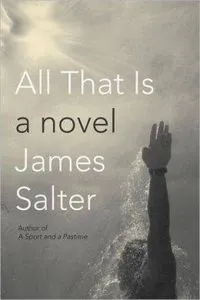 All That Is by James Salter
It has been more than 30 years since Salter last published a novel. He’s granite. He’s damp skin. He’s an unflinching eye. I don’t know anything about the gestation of this novel, and in a way I’m glad because it nearly doesn’t feel like fiction. It feels like a life: the trajectory, in some ways enviable, of Philip Bowman, a young WWII soldier who becomes a New York book editor. The story eddies and curves, as Salter often looks over to secondary characters and follows them for a little while. Forgive the pomposity, but it reminds me of the angels in Wim Wenders’s “Wings of Desire.” At the moment, something quite devastating is about to happen to Bowman. I had to put the book down, to catch my breath, to hope he escapes.
–Jennifer Paull
All That Is by James Salter
It has been more than 30 years since Salter last published a novel. He’s granite. He’s damp skin. He’s an unflinching eye. I don’t know anything about the gestation of this novel, and in a way I’m glad because it nearly doesn’t feel like fiction. It feels like a life: the trajectory, in some ways enviable, of Philip Bowman, a young WWII soldier who becomes a New York book editor. The story eddies and curves, as Salter often looks over to secondary characters and follows them for a little while. Forgive the pomposity, but it reminds me of the angels in Wim Wenders’s “Wings of Desire.” At the moment, something quite devastating is about to happen to Bowman. I had to put the book down, to catch my breath, to hope he escapes.
–Jennifer Paull
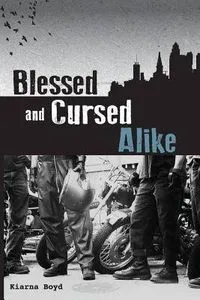 Blessed and Cursed Alike by Kiarna Boyd
One of the millions of great things about books is how you learn things. Learning is fun! Open head, insert information. Most of the main characters in Blessed and Cursed Alike work for motorcycle courier companies, which I learned is a real-life occupation. It’s like being a bike messenger, only louder, faster and crazier. Boyd based her characters on the motorcycle couriers of London after witnessing them in action. It’s wild, dangerous work, and a motorcycle courier’s life expectancy while on the job is only two and a half years. Gulp! So add to the adrenaline-fueled courier lifestyle a dark, wet, unnamed city, an occult conspiracy, and familial bonds and friendships, and you have a fantastic fantasy novel. The action scenes are wonderfully realized, the sexy bits are sexy, and the characters are all worthy of the attention they’re given. This book made me want a motorcycle, a girlfriend, a two-legged cat, and cake. (I just realized that most of those things purr.) I loved it.
–Liberty Hardy
Blessed and Cursed Alike by Kiarna Boyd
One of the millions of great things about books is how you learn things. Learning is fun! Open head, insert information. Most of the main characters in Blessed and Cursed Alike work for motorcycle courier companies, which I learned is a real-life occupation. It’s like being a bike messenger, only louder, faster and crazier. Boyd based her characters on the motorcycle couriers of London after witnessing them in action. It’s wild, dangerous work, and a motorcycle courier’s life expectancy while on the job is only two and a half years. Gulp! So add to the adrenaline-fueled courier lifestyle a dark, wet, unnamed city, an occult conspiracy, and familial bonds and friendships, and you have a fantastic fantasy novel. The action scenes are wonderfully realized, the sexy bits are sexy, and the characters are all worthy of the attention they’re given. This book made me want a motorcycle, a girlfriend, a two-legged cat, and cake. (I just realized that most of those things purr.) I loved it.
–Liberty Hardy
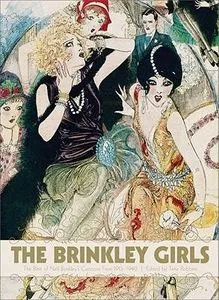 The Brinkley Girls edited by Trina Robbins
In the 1910’s Nell Brinkley went to New York City to work as an illustrator for one of William Randolph Hearst’s newspapers, The New York Evening Journal. Brinkley’s illustrations of women wearing the latest fashions and possessing masses of curly hair made every woman want to look like a “Brinkley girl.” Through WWI and the 1920s, Brinkley published weekly full-page color comics with surprisingly feminist storylines—women who go on adventures and save the hero, rather than vice-versa—in a visual style that influenced the fashion of women for an entire generation. I adored this book, and not just because Brinkley grew up not very far from where I did; her illustrations are gorgeous and it’s easy to see why women wanted to obtain her “look,” even going so far as purchase Brinkley hair products. All of Brinkley’s color comics are included, and they reminded me of manga series today. Definitely recommend this for anyone interested in Jazz Age or Edwardian art and fashion, or if you read manga.
–Tasha Brandstatter
The Brinkley Girls edited by Trina Robbins
In the 1910’s Nell Brinkley went to New York City to work as an illustrator for one of William Randolph Hearst’s newspapers, The New York Evening Journal. Brinkley’s illustrations of women wearing the latest fashions and possessing masses of curly hair made every woman want to look like a “Brinkley girl.” Through WWI and the 1920s, Brinkley published weekly full-page color comics with surprisingly feminist storylines—women who go on adventures and save the hero, rather than vice-versa—in a visual style that influenced the fashion of women for an entire generation. I adored this book, and not just because Brinkley grew up not very far from where I did; her illustrations are gorgeous and it’s easy to see why women wanted to obtain her “look,” even going so far as purchase Brinkley hair products. All of Brinkley’s color comics are included, and they reminded me of manga series today. Definitely recommend this for anyone interested in Jazz Age or Edwardian art and fashion, or if you read manga.
–Tasha Brandstatter
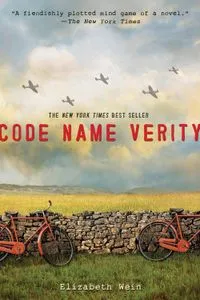 Code Name Verity by Elizabeth Wein
I know, I know, everyone else already read this book and loved it and it’s silly that I’m even gushing about it now because I’m so far behind, right? (Actually, I know a lot of people who haven’t read it, so there.) I haven’t finished it yet, but I am loving it a lot. It’s the perfect combination of a likeable, gently snarky tone, excellent writing, and impeccable historical research. I know I’m apparently in for a lot of twists and turns, and I’m looking forward to them all.
–Jeanette Solomon
Code Name Verity by Elizabeth Wein
I know, I know, everyone else already read this book and loved it and it’s silly that I’m even gushing about it now because I’m so far behind, right? (Actually, I know a lot of people who haven’t read it, so there.) I haven’t finished it yet, but I am loving it a lot. It’s the perfect combination of a likeable, gently snarky tone, excellent writing, and impeccable historical research. I know I’m apparently in for a lot of twists and turns, and I’m looking forward to them all.
–Jeanette Solomon
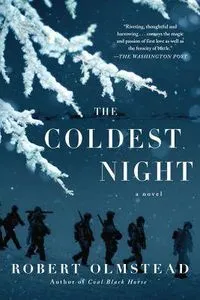 The Coldest Night by Robert Olmstead
The 1950s conflict in Korea may be “The Forgotten War,” but once you pass through the pages of Robert Olmstead’s devastatingly real novel, it will be hard to disremember the Korean War. Olmstead often turns his attention to historical military conflicts (see also: Coal Black Horse, his 2007 novel about the Civil War), but with The Coldest Night, he has reached a new level of gritty, unsparing literature that also floats like a lyrical dream, sentence by sentence. The book is the saga of Henry Childs and is essentially divided into three parts: the years before Henry ships off to war which tells the beautiful love story between Henry and a girl named Mercy; the harrowing battle accounts in Korea; and Henry’s return from war and his troubled attempts to re-enter civilian life. Olmstead’s descriptions of battle are deceptively simple in detail, but it’s been hard for me to shake them from my head. Like this sentence: “Then the flanks exploded with gunfire and grenades until there was no sound at all but the long unceasing sound of the world’s endless thunder concentrated in one place.” Olmstead fills all of his pages with linguistic thunder.
–David Abrams
The Coldest Night by Robert Olmstead
The 1950s conflict in Korea may be “The Forgotten War,” but once you pass through the pages of Robert Olmstead’s devastatingly real novel, it will be hard to disremember the Korean War. Olmstead often turns his attention to historical military conflicts (see also: Coal Black Horse, his 2007 novel about the Civil War), but with The Coldest Night, he has reached a new level of gritty, unsparing literature that also floats like a lyrical dream, sentence by sentence. The book is the saga of Henry Childs and is essentially divided into three parts: the years before Henry ships off to war which tells the beautiful love story between Henry and a girl named Mercy; the harrowing battle accounts in Korea; and Henry’s return from war and his troubled attempts to re-enter civilian life. Olmstead’s descriptions of battle are deceptively simple in detail, but it’s been hard for me to shake them from my head. Like this sentence: “Then the flanks exploded with gunfire and grenades until there was no sound at all but the long unceasing sound of the world’s endless thunder concentrated in one place.” Olmstead fills all of his pages with linguistic thunder.
–David Abrams
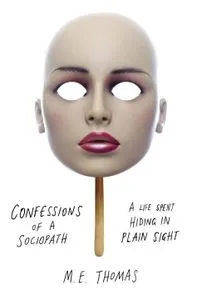 Confessions of a Sociopath: A Life Spent Hiding in Plain Sight by M.E. Thomas
M.E. Thomas is a sociopath, but she’s never killed anyone. She’s also a law professor and a Sunday school teacher. Confessions of a Sociopath is both Thomas’ story of self-discovery and the introduction to a fascinating, mostly silent community. She investigates the development of the concept of sociopathy, from the first time a similar condition was described to brain scan studies of famously murderous families. She even touches on how she would recommend parenting a child sociopath, which is fascinating. Thomas not entirely benign – her favorite hobby is “ruining people” which she explains in depth with fascinating candor and detail. Thomas’ bold, blunt voice and well-researched ideas are captivating; more than once I caught myself thinking wow, I wish I was a sociopath too. (Final verdict: no, I don’t.) My favorite part was when Thomas told the story of the time she came closest to vengeful murder. What was the one thing that nearly pushed her over the edge? The DC metro system.
–Becky Cole
Confessions of a Sociopath: A Life Spent Hiding in Plain Sight by M.E. Thomas
M.E. Thomas is a sociopath, but she’s never killed anyone. She’s also a law professor and a Sunday school teacher. Confessions of a Sociopath is both Thomas’ story of self-discovery and the introduction to a fascinating, mostly silent community. She investigates the development of the concept of sociopathy, from the first time a similar condition was described to brain scan studies of famously murderous families. She even touches on how she would recommend parenting a child sociopath, which is fascinating. Thomas not entirely benign – her favorite hobby is “ruining people” which she explains in depth with fascinating candor and detail. Thomas’ bold, blunt voice and well-researched ideas are captivating; more than once I caught myself thinking wow, I wish I was a sociopath too. (Final verdict: no, I don’t.) My favorite part was when Thomas told the story of the time she came closest to vengeful murder. What was the one thing that nearly pushed her over the edge? The DC metro system.
–Becky Cole
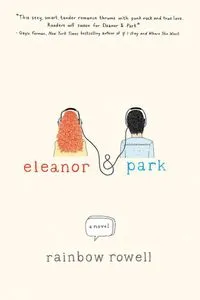 Eleanor and Park by Rainbow Rowell
I’d been meaning to read Eleanor and Park for months. It kept popping up on my Tumblr dash, and then John Green wrote that amazing review for in the NY Times. I finally got my chance when a coworker dropped it off with a post-it note that said: “Get ready to make a playlist.”
I took it home that night, started it, finished it, and spent the rest of the night feeling nostalgic for a time I’d never experienced. High school in the ’80s. I loved Eleanor and Park. I loved how realistically Rainbow Rowell portrayed both sides of their relationship: the insecurity, the hesitancy, the miscommunications. I loved Park’s first generation-otherness. I loved Eleanor’s misguided family loyalty. All of it. The music was almost another character in the book, with Park’s punk to New Wave, and Eleanor’s disbelief that he doesn’t really know The Beatles. I only have one complaint, and that is the last four pages. I didn’t love the last four pages. That being said, like John Green, Rowell knows exactly how to write teenagers who don’t fit in to any one track. Who, for whatever reason, find themselves on the outside. I can totally tell why (beyond the handsome, nerdy half-Korean Park) that kids on Tumblr are obsessed with this book. I kind of wish I could go back in time and reread it again for the first time.
–Preeti Chhibber
Eleanor and Park by Rainbow Rowell
I’d been meaning to read Eleanor and Park for months. It kept popping up on my Tumblr dash, and then John Green wrote that amazing review for in the NY Times. I finally got my chance when a coworker dropped it off with a post-it note that said: “Get ready to make a playlist.”
I took it home that night, started it, finished it, and spent the rest of the night feeling nostalgic for a time I’d never experienced. High school in the ’80s. I loved Eleanor and Park. I loved how realistically Rainbow Rowell portrayed both sides of their relationship: the insecurity, the hesitancy, the miscommunications. I loved Park’s first generation-otherness. I loved Eleanor’s misguided family loyalty. All of it. The music was almost another character in the book, with Park’s punk to New Wave, and Eleanor’s disbelief that he doesn’t really know The Beatles. I only have one complaint, and that is the last four pages. I didn’t love the last four pages. That being said, like John Green, Rowell knows exactly how to write teenagers who don’t fit in to any one track. Who, for whatever reason, find themselves on the outside. I can totally tell why (beyond the handsome, nerdy half-Korean Park) that kids on Tumblr are obsessed with this book. I kind of wish I could go back in time and reread it again for the first time.
–Preeti Chhibber
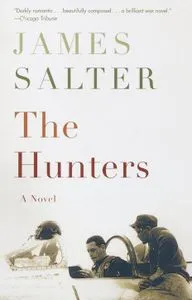 The Hunters by James Salter
I’m shamefully late to the Salter-appreciation party, but with All That Is just released I decided to start with his first novel–which not only lived up to the hype, it shot the hype clean out of the sky. The Hunters is ostensibly about fighter pilots in the Korean War, but it is as much a meditation on the nature of ambition as it is about the dangers of aerial combat. Most of the drama actually takes place in the quiet moments on the ground, suffering along with Captain Cleve Connell. He is crippled with angst by every missed opportunity and filled with jealousy as he watches less worthy pilots getting all the glory. As you read about the fleeting joys of achievement and the daily torment that comes with lofty ambitions, you sense that Salter (who was himself a pilot in Korea) is talking as much about his artistic aspirations as he is recounting life in the cockpit. This is reinforced by a scene that occurs while Connell is on shore leave and far from all the action (at least combat action—it is, after all, shore leave). Visiting a family acquaintance who is a Japanese painter, Connell is struck by the beauty of the artist’s work. It becomes clear that while they operate in completely different worlds, Connell sees the artist as a comrade in arms, someone who has also dared to reach for the heavens and knows the rarified air of true greatness.
–Minh Le
The Hunters by James Salter
I’m shamefully late to the Salter-appreciation party, but with All That Is just released I decided to start with his first novel–which not only lived up to the hype, it shot the hype clean out of the sky. The Hunters is ostensibly about fighter pilots in the Korean War, but it is as much a meditation on the nature of ambition as it is about the dangers of aerial combat. Most of the drama actually takes place in the quiet moments on the ground, suffering along with Captain Cleve Connell. He is crippled with angst by every missed opportunity and filled with jealousy as he watches less worthy pilots getting all the glory. As you read about the fleeting joys of achievement and the daily torment that comes with lofty ambitions, you sense that Salter (who was himself a pilot in Korea) is talking as much about his artistic aspirations as he is recounting life in the cockpit. This is reinforced by a scene that occurs while Connell is on shore leave and far from all the action (at least combat action—it is, after all, shore leave). Visiting a family acquaintance who is a Japanese painter, Connell is struck by the beauty of the artist’s work. It becomes clear that while they operate in completely different worlds, Connell sees the artist as a comrade in arms, someone who has also dared to reach for the heavens and knows the rarified air of true greatness.
–Minh Le
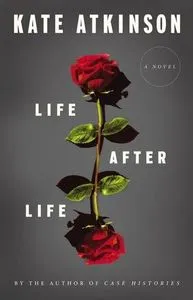 Life After Life by Kate Atkinson
It’s tough to tell people what the premise of Atkinson’s newest novel is, without completely bungling it. “Well, see, this woman Ursula who was born in 1911, dies over and over again. But she keeps being reborn at the same time, with slightly different circumstances, so that she makes it a little bit farther in her life before she dies again in some other way.” This makes it sound like the a downright confusing and pointless story (the same life over and over?), when in fact it is the exact opposite of those things. Atkinson beautifully unfurls a life again and again and the same moments are told in varying ways so as to make it feel fresh and new each time. Whether she switches the point of view or the timing, each life that Ursula lives is a snapshot, elegantly framed and lit, so as to allow the reader a glimpse of the artistic eye behind it all. Small choices, brief hesitations, a wary feeling in the stomach mean the difference between life and death, countless times over, and the lingering sensation is that, not only is life fragile, it is also random and powerful at the same time. It’s a haunting sensation that has stayed with me long after finishing the last page (which I did in a flurry. The last 250 pages sped by.) This is THE book of the year for me, and 2013 is only halfway done.
–Rachel Manwill
Life After Life by Kate Atkinson
It’s tough to tell people what the premise of Atkinson’s newest novel is, without completely bungling it. “Well, see, this woman Ursula who was born in 1911, dies over and over again. But she keeps being reborn at the same time, with slightly different circumstances, so that she makes it a little bit farther in her life before she dies again in some other way.” This makes it sound like the a downright confusing and pointless story (the same life over and over?), when in fact it is the exact opposite of those things. Atkinson beautifully unfurls a life again and again and the same moments are told in varying ways so as to make it feel fresh and new each time. Whether she switches the point of view or the timing, each life that Ursula lives is a snapshot, elegantly framed and lit, so as to allow the reader a glimpse of the artistic eye behind it all. Small choices, brief hesitations, a wary feeling in the stomach mean the difference between life and death, countless times over, and the lingering sensation is that, not only is life fragile, it is also random and powerful at the same time. It’s a haunting sensation that has stayed with me long after finishing the last page (which I did in a flurry. The last 250 pages sped by.) This is THE book of the year for me, and 2013 is only halfway done.
–Rachel Manwill
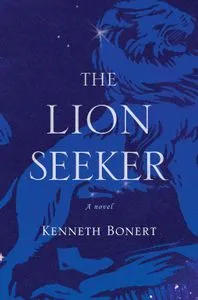 The Lion Seeker by Kenneth Bonert (Houghton Mifflin Harcourt, October 15, 2013)
Its pub date maybe a long way away, but I think this book is worth getting excited about now. Following the life of a Jewish Lithuanian immigrant family in Johannesburg, South Africa, before and during World War II, The Lion Seeker is a knockout of a historical novel. The voice, a close third-person, is full of the cadences of different dialects; the plotline is revelatory (at least for this reader — South Africa in the 1940s was something I knew nothing about), nuanced, and compelling. This one should be at the top of your TBR list for Fall.
–Jenn Northington
The Lion Seeker by Kenneth Bonert (Houghton Mifflin Harcourt, October 15, 2013)
Its pub date maybe a long way away, but I think this book is worth getting excited about now. Following the life of a Jewish Lithuanian immigrant family in Johannesburg, South Africa, before and during World War II, The Lion Seeker is a knockout of a historical novel. The voice, a close third-person, is full of the cadences of different dialects; the plotline is revelatory (at least for this reader — South Africa in the 1940s was something I knew nothing about), nuanced, and compelling. This one should be at the top of your TBR list for Fall.
–Jenn Northington
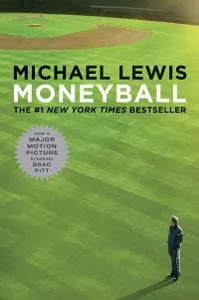 Moneyball: The Art of Winning An Unfair Game by Michael Lewis
When a conversation takes place on a subject only few people have access or interest in, for example my husband and a friend gassing on and on about Star Trek, a third person (me) might come in and say, “Guys, you’re a little ‘inside baseball,’” meaning Byzantine, nerdy, nitpicky, and clubby. However in the case of this book I loved it. And now when I watch an Orioles game and some little kid next to me is going on about how his hero on the team is able to hit it outta the ballpark, I’m like, “Whoah, buddy, sure, but what’s his on base percentage?”
–Elizabeth Bastos
Moneyball: The Art of Winning An Unfair Game by Michael Lewis
When a conversation takes place on a subject only few people have access or interest in, for example my husband and a friend gassing on and on about Star Trek, a third person (me) might come in and say, “Guys, you’re a little ‘inside baseball,’” meaning Byzantine, nerdy, nitpicky, and clubby. However in the case of this book I loved it. And now when I watch an Orioles game and some little kid next to me is going on about how his hero on the team is able to hit it outta the ballpark, I’m like, “Whoah, buddy, sure, but what’s his on base percentage?”
–Elizabeth Bastos
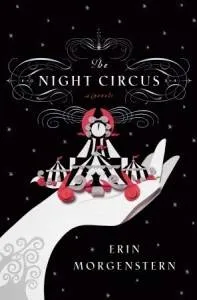 The Night Circus by Erin Morgenstern
I had actually not intended to read this book. I blame marketing. I thought it was a sweet, sweet, slightly girly romance fantasy that took place in a cute circus. It did not appeal to me. But people kept recommending it, and everyone just seemed to love it. I picked it up at an airport bookstore to go along with GRRM’s Dance With Dragons in a 2-for-1 book deal that was going on. DWD was a bit heavy to start reading on a short plane ride, so I opened The Night Circus instead, and was immediately whisked away into a complete and detailed world of magic and intrigue. Sure, there is romance, but this is not a romance novel. It has often been compared to Susanna Clarke’s Jonathan Strange & Mr. Norrell, and I think it a fair comparison; both books are long and intricate, both books have interesting characters that perform magic, and both books are an absolute joy to read. Believe the hype, buy this book.
–Johann Thorsson
The Night Circus by Erin Morgenstern
I had actually not intended to read this book. I blame marketing. I thought it was a sweet, sweet, slightly girly romance fantasy that took place in a cute circus. It did not appeal to me. But people kept recommending it, and everyone just seemed to love it. I picked it up at an airport bookstore to go along with GRRM’s Dance With Dragons in a 2-for-1 book deal that was going on. DWD was a bit heavy to start reading on a short plane ride, so I opened The Night Circus instead, and was immediately whisked away into a complete and detailed world of magic and intrigue. Sure, there is romance, but this is not a romance novel. It has often been compared to Susanna Clarke’s Jonathan Strange & Mr. Norrell, and I think it a fair comparison; both books are long and intricate, both books have interesting characters that perform magic, and both books are an absolute joy to read. Believe the hype, buy this book.
–Johann Thorsson
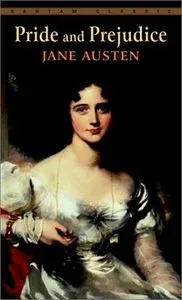 Pride and Prejudice by Jane Austen
Continuing my foray into Austenland, I half expected to be disappointed by the uber-popular Pride and Prejudice. I had my doubts about a book that managed to inspire such spin-offs as Pride and Prejudice and Zombies and Spank Me, Mr. Darcy. As it turns out my concerns were unfounded. I think the mania that surrounds Austen’s seminal work has diluted the power of the original story to some extent. Nevertheless, it’s impossible not to fall in love with the plucky, ahead-of-her-time heroine and everyone’s favorite grumpy INTJ.
–Kate Scott
Pride and Prejudice by Jane Austen
Continuing my foray into Austenland, I half expected to be disappointed by the uber-popular Pride and Prejudice. I had my doubts about a book that managed to inspire such spin-offs as Pride and Prejudice and Zombies and Spank Me, Mr. Darcy. As it turns out my concerns were unfounded. I think the mania that surrounds Austen’s seminal work has diluted the power of the original story to some extent. Nevertheless, it’s impossible not to fall in love with the plucky, ahead-of-her-time heroine and everyone’s favorite grumpy INTJ.
–Kate Scott
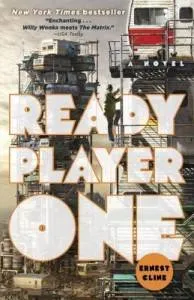 Ready Player One by Ernest Cline
In Ready Player One’s distant dystopian (of course) future, much of humanity spends the bulk of their time plugged into an immersive online RPG called the OASIS. This virtual world has its own economy, its own schools, and, naturally, its own predatory multinational corporate villains. These baddies are after the same prize as Wade Watts (OASIS name: Parzival), an easter egg – worth a fortune – planted in the OASIS by its deceased genius creator. Ready Player One is stuffed with more eighties geek nostalgia than I would’ve thought possible, but Cline does a brilliant job of maintaining a sense of accessibility and a brisk enough pace that his near-constant geeky references never derail the reader (I probably “got” 35-40% of them, but was amused by and enjoyed almost all of them anyway). By the end, I was convinced that Ready Player One should have the same obsessive following that The Hunger Games does. Many of the same action-hero tropes are there, but a more mature approach to character and a smartly (and often hilariously) constructed setting (both the real and virtual) make Cline’s book stand out. Plus, (and I don’t know exactly why this matters, but it made a difference for me) it reads like the work of someone who had an indecent amount of fun writing it. Every page just pops with the joy of somebody head over heels for the world he’s created. Plug in, turn on, read away.
–Josh Corman
Ready Player One by Ernest Cline
In Ready Player One’s distant dystopian (of course) future, much of humanity spends the bulk of their time plugged into an immersive online RPG called the OASIS. This virtual world has its own economy, its own schools, and, naturally, its own predatory multinational corporate villains. These baddies are after the same prize as Wade Watts (OASIS name: Parzival), an easter egg – worth a fortune – planted in the OASIS by its deceased genius creator. Ready Player One is stuffed with more eighties geek nostalgia than I would’ve thought possible, but Cline does a brilliant job of maintaining a sense of accessibility and a brisk enough pace that his near-constant geeky references never derail the reader (I probably “got” 35-40% of them, but was amused by and enjoyed almost all of them anyway). By the end, I was convinced that Ready Player One should have the same obsessive following that The Hunger Games does. Many of the same action-hero tropes are there, but a more mature approach to character and a smartly (and often hilariously) constructed setting (both the real and virtual) make Cline’s book stand out. Plus, (and I don’t know exactly why this matters, but it made a difference for me) it reads like the work of someone who had an indecent amount of fun writing it. Every page just pops with the joy of somebody head over heels for the world he’s created. Plug in, turn on, read away.
–Josh Corman
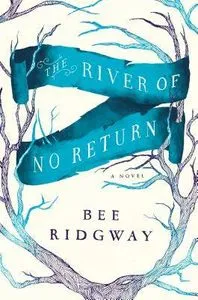 The River of No Return by Bee Ridgway
When I decided to take Tasha’s advice and buy The River of No Return, I neglected to pay enough attention to the second part of her recommendation: “make sure to start it on a day you don’t have to go to work.”Oops. I didn’t end up sleeping through a meeting early the next day, but it was a near thing. I was immediately drawn into Ridgway’s engrossing debut novel, which follows a nineteenth-century marquess who’s ripped out of his own time, deposited in the twenty-first century, and then sent back to Regency England with an ambiguous mission. The technicalities/paradoxes/etc. of time travel are kept (for the most part) to a merciful minimum, leaving room for a passel of complicated, entertaining characters and exceptionally well-drawn settings. Now if only I could pop into a future where Ridgway’s written more books…
–Derek Attig
The River of No Return by Bee Ridgway
When I decided to take Tasha’s advice and buy The River of No Return, I neglected to pay enough attention to the second part of her recommendation: “make sure to start it on a day you don’t have to go to work.”Oops. I didn’t end up sleeping through a meeting early the next day, but it was a near thing. I was immediately drawn into Ridgway’s engrossing debut novel, which follows a nineteenth-century marquess who’s ripped out of his own time, deposited in the twenty-first century, and then sent back to Regency England with an ambiguous mission. The technicalities/paradoxes/etc. of time travel are kept (for the most part) to a merciful minimum, leaving room for a passel of complicated, entertaining characters and exceptionally well-drawn settings. Now if only I could pop into a future where Ridgway’s written more books…
–Derek Attig
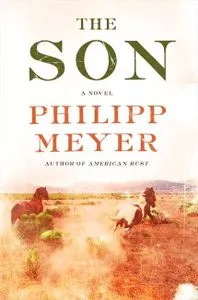 The Son by Philipp Meyer
A multi-generational saga of the American West that’s one part East of Eden and one part Cormac McCarthy. Starting with the pre-Civil War Texas frontier, the book follows the rise and fall of a violent and complicated family, all the way to its present-day, oil-money-drenched state. It examines the ideas of what it means to be loyal, what it means to be “a real man” (and whether or not that’s even a thing) and what money does to a family when the present generations have done nothing to earn it. It will make you simultaneously want to hug your children and protect them from the world, and send them outside to earn their keep. It’s beautifully written, and so thought-provoking that I haven’t stopped thinking about it since I put it down.
–Amanda Nelson
The Son by Philipp Meyer
A multi-generational saga of the American West that’s one part East of Eden and one part Cormac McCarthy. Starting with the pre-Civil War Texas frontier, the book follows the rise and fall of a violent and complicated family, all the way to its present-day, oil-money-drenched state. It examines the ideas of what it means to be loyal, what it means to be “a real man” (and whether or not that’s even a thing) and what money does to a family when the present generations have done nothing to earn it. It will make you simultaneously want to hug your children and protect them from the world, and send them outside to earn their keep. It’s beautifully written, and so thought-provoking that I haven’t stopped thinking about it since I put it down.
–Amanda Nelson
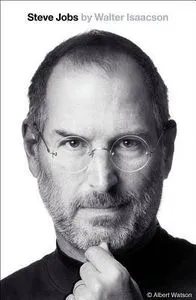 Steve Jobs by Walter Isaacson
My takeaways from the initial buzz about Steve Jobs were: 1) He was kind of a jerk, and 2) He ate a lot of weird orange food. 650 pages later, I agree that Jobs would’ve been an asshole to work for, yet I admire his determination to bring his visions to life without sparing any egos. Isaacson entertained me with dishy stories about Jobs’ early hippie ethos — his obsession with meditation, veganism, LSD, and Bob Dylan sparked a lifelong tension between fighting versus becoming Big Brother. But the big shiny jewel of the biography is the debate between closed versus open systems. While I’m fundamentally an open systems kinda girl, this book makes a convincing argument that closed systems CAN win the prize for most poetic and pretty user experience.
–Rachel Smalter Hall
Steve Jobs by Walter Isaacson
My takeaways from the initial buzz about Steve Jobs were: 1) He was kind of a jerk, and 2) He ate a lot of weird orange food. 650 pages later, I agree that Jobs would’ve been an asshole to work for, yet I admire his determination to bring his visions to life without sparing any egos. Isaacson entertained me with dishy stories about Jobs’ early hippie ethos — his obsession with meditation, veganism, LSD, and Bob Dylan sparked a lifelong tension between fighting versus becoming Big Brother. But the big shiny jewel of the biography is the debate between closed versus open systems. While I’m fundamentally an open systems kinda girl, this book makes a convincing argument that closed systems CAN win the prize for most poetic and pretty user experience.
–Rachel Smalter Hall
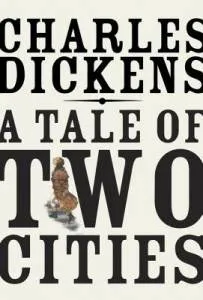 A Tale of Two Cities by Charles Dickens
There’s the resonance: the daily news of the revolt become civil war in Syria, the ongoing upheaval and instability in struggling European and Middle Eastern countries, the gaping disparity between rich and poor in America—all echo elements of the world (and it is a world) portrayed by Dickens. If you want, you can dwell on common criticisms—the over-plotting, the plethora of heavy drama, the typing of whole classes. But this book is one of those truly special works of art: a master fully engaged in his craft at work on an absolutely ambitious and ultimately successful project. And as a side bonus in this 21st century, it’s free for download on iTunes.
–Loyal Miles
A Tale of Two Cities by Charles Dickens
There’s the resonance: the daily news of the revolt become civil war in Syria, the ongoing upheaval and instability in struggling European and Middle Eastern countries, the gaping disparity between rich and poor in America—all echo elements of the world (and it is a world) portrayed by Dickens. If you want, you can dwell on common criticisms—the over-plotting, the plethora of heavy drama, the typing of whole classes. But this book is one of those truly special works of art: a master fully engaged in his craft at work on an absolutely ambitious and ultimately successful project. And as a side bonus in this 21st century, it’s free for download on iTunes.
–Loyal Miles
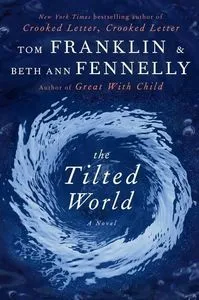 The Tilted World by Tom Franklin and Beth Ann Fennelly (William Morrow, October 1, 2013)
What do you get when a Los Angeles Times Book Prize winner co-writes a novel with his Pushcart Prize winning wife? The Tilted World by Tom Franklin and Beth Ann Fennelly gives you the answer AND lights it on fire. I think two copies of the book should hold tiny champagne flutes and toast each other because AWESOME. Set during the great flood of 1927, you have a bootlegging woman who lost her infant son, a prohibition officer, an orphaned gypsy baby, rising flood waters, HOOCH, and of course… natural enemies who fall in love. It’s a great story that hopefully will make people want to dive deeper into the Mississippi Flood of 1927, which is often forgotten. The way Tom and Beth Ann are able to mix his prose with her poetry is just outstanding. I wish you all could read it yesterday, but you’ll have to wait until October.
–Emily Gatlin
The Tilted World by Tom Franklin and Beth Ann Fennelly (William Morrow, October 1, 2013)
What do you get when a Los Angeles Times Book Prize winner co-writes a novel with his Pushcart Prize winning wife? The Tilted World by Tom Franklin and Beth Ann Fennelly gives you the answer AND lights it on fire. I think two copies of the book should hold tiny champagne flutes and toast each other because AWESOME. Set during the great flood of 1927, you have a bootlegging woman who lost her infant son, a prohibition officer, an orphaned gypsy baby, rising flood waters, HOOCH, and of course… natural enemies who fall in love. It’s a great story that hopefully will make people want to dive deeper into the Mississippi Flood of 1927, which is often forgotten. The way Tom and Beth Ann are able to mix his prose with her poetry is just outstanding. I wish you all could read it yesterday, but you’ll have to wait until October.
–Emily Gatlin
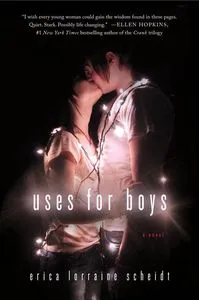 Uses for Boys by Erica Lorraine Scheidt
There is a section in this fabulous, mesmerizing young adult novel that was so sad I could feel it throughout my entire body. My limbs grew heavy and my frown deepened. At one point I said to myself, “I don’t think I can bear this.” It was so awesome. This is the story of sixteen-year-old Anna who struggles through teenagedom, raising herself because her mom’s always off trying to find or keep the latest boyfriend. Anna finds many uses for boys on her journey, not all those uses are good or good for her. This a book like Marcy Dermansky’s Bad Marie, that flies by in a blink because you become so entangled in Anna’s voice and the decisions she makes that you can’t seem to stop reading it.
–Jodi Chromey
Uses for Boys by Erica Lorraine Scheidt
There is a section in this fabulous, mesmerizing young adult novel that was so sad I could feel it throughout my entire body. My limbs grew heavy and my frown deepened. At one point I said to myself, “I don’t think I can bear this.” It was so awesome. This is the story of sixteen-year-old Anna who struggles through teenagedom, raising herself because her mom’s always off trying to find or keep the latest boyfriend. Anna finds many uses for boys on her journey, not all those uses are good or good for her. This a book like Marcy Dermansky’s Bad Marie, that flies by in a blink because you become so entangled in Anna’s voice and the decisions she makes that you can’t seem to stop reading it.
–Jodi Chromey
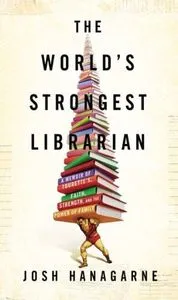 The World’s Strongest Librarian by Josh Hanagarne
When I told people I was reading a memoir by a Mormon weight-lifting librarian with Tourette Syndrome, I got some pretty quizzical looks. And I suppose I understand why — there are a lot of ways a memoir about such widely different subjects could go awry, but Josh Hanagarne manages to avoid them all. In fact, The World’s Strongest Librarian was one of the best memoirs I’ve read in a long time. It’s funny, smart and a little sad, but Hanagarne approaches every incident with humility and a deep appreciation for the people in his life who have helped him succeed. I loved this one.
–Kim Ukura
Your turn, readers! What was your best book of the month?
The World’s Strongest Librarian by Josh Hanagarne
When I told people I was reading a memoir by a Mormon weight-lifting librarian with Tourette Syndrome, I got some pretty quizzical looks. And I suppose I understand why — there are a lot of ways a memoir about such widely different subjects could go awry, but Josh Hanagarne manages to avoid them all. In fact, The World’s Strongest Librarian was one of the best memoirs I’ve read in a long time. It’s funny, smart and a little sad, but Hanagarne approaches every incident with humility and a deep appreciation for the people in his life who have helped him succeed. I loved this one.
–Kim Ukura
Your turn, readers! What was your best book of the month?










